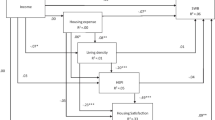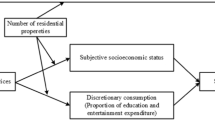Abstract
Owning a house is important for most young people in urban China, especially for migrants. For migrants who want to settle in their working city, high housing prices may have a negative effect on their subjective well-being. Using nationally representative migrant survey data, this study examines the relationship between housing prices and migrants’ subjective well-being in China. The results indicate that housing prices play a significantly negative role in migrants’ subjective well-being, especially for low-educated, female, and rural-to-urban migrants. These results are robust to instrumental variable analysis. In addition to the direct mental effect, there is evidence of two possible ways in which housing prices may affect migrants’ subjective well-being. First, high housing prices increase the possibility of migrants living alone in the city, and a geographical family split decreases their subjective well-being. Second, to earn more to purchase a house in the working city in the future, they are more likely to work longer hours and decrease their leisure time, which may cause a decrease in their happiness.





Similar content being viewed by others
Notes
Data source: National Bureau of Statistics of the People’s Republic of China.
Data source: National Bureau of Statistics of the People’s Republic of China.
The data was obtained from the 2012 China Migrants Dynamic Survey.
Démurger et al., (2009) show that the rural migrants in China work on average 69 h per week, while urban residents only work approximately 44 h per week.
Residential housing sales amount is the total value of all residential houses of the city sold in that year, and residential housing sales area is the total square meters of all residential houses sold of the same city in that year.
The first-stage F-statistic of the instrumental equation in Column (4) of Table 7 is 2340.463, which is above the rule-of-thumb criterion of 10, and it satisfies the standard criteria of instrumental variable (Stock & Yogo, 2005). The p value of overidentifying restrictions Hansen’s J test is 0.162, so the null hypothesis that the overidentifying exclusion restrictions are valid cannot be rejected.
The marginal effect of city housing price in Column (3) of Table 2 is 0.0088, and we calculate the ratio of mediation effect according to this marginal effect coefficient.
References
Abeysinghe, T., & Gu, J. (2011). Lifetime income and housing affordability in Singapore. Urban Studies, 48(9), 1875–1891
Ai, A. L., Peterson, C., Tice, T. N., Bolling, S. F., & Koenig, H. G. (2004). Faith-based and secular pathways to hope and optimism subconstructs in middle-aged and older cardiac patients. Journal of Health Psychology, 9(3), 435–450
Ambrey, C., & Fleming, C. (2013). Public greenspace and life satisfaction in urban Australia. Urban Studies, 51(6), 1290–1321
Appau, S., Churchill, S. A., & Farrell, L. (2019). Social integration and subjective wellbeing. Applied Economics, 51(16), 1748–1761
Artazcoz, L., Borrell, C., Benach, J., Cortès, I., & Rohlfs, I. (2004). Women, family demands and health: The importance of employment status and socio-economic position. Social Science & Medicine, 59(2), 263–274
Attanasio, O. P., Blow, L., Hamilton, R., & Leicester, A. (2009). Booms and busts: Consumption, house prices and expectations. Economica, 76(301), 20–50
Azimi, N., & Esmaeilzadeh, Y. (2017). Assessing the relationship between house types and residential satisfaction in Tabriz. Iran International Journal of Urban Sciences, 21(2), 185–203
Bian, Y., Hao, M., & Li, Y. (2018). Social networks and subjective well-being: A comparison of Australia, Britain, and China. Journal of Happiness Studies, 19(8), 2489–2508
Chen, F., Liu, H., Vikram, K., & Guo, Y. (2015). For better or worse: The health implications of marriage separation due to migration in rural China. Demography, 52(4), 1321–1343
Chen, H., Wang, X., Liu, Y., & Liu, Y. (2020). Migrants’ choice of household split or reunion in China’s urbanisation process: The effect of objective and subjective socioeconomic status. Cities, 102, 102669
Churchill, S. A., & Smyth, R. (2019). Transport poverty and subjective wellbeing. Transportation Research Part A: Policy and Practice, 124, 40–54
Churchill, S. A., Smyth, R., & Farrell, L. (2020). Fuel poverty and subjective wellbeing. Energy Economics, 86, 104650
Démurger, S., Gurgand, M., Li, S., & Yue, X. (2009). Migrants as second-class workers in urban China? A decomposition analysis. Journal of Comparative Economics, 37(4), 610–628
Dong, Z., Hui, E. C., & Jia, S. (2017). How does housing price affect consumption in China: Wealth effect or substitution effect? Cities, 64, 1–8
Fang, Z., & Sakellariou, C. (2016). Social insurance, income and subjective well-being of rural migrants in China—An application of unconditional quantile regression. Journal of Happiness Studies, 17(4), 1635–1657
Feng, J., Tang, S., & Chuai, X. (2018). The impact of neighbourhood environments on quality of life of elderly people: Evidence from Nan**g, China. Urban Studies, 55(9), 2020–2039
Florida, R., Mellander, C., & Rentfrow, P. J. (2013). The happiness of cities. Regional Studies, 47(4), 613–627
Foye, C., Clapham, D., & Gabrieli, T. (2018). Home-ownership as a social norm and positional good: Subjective wellbeing evidence from panel data. Urban Studies, 55(6), 1290–1312
Fu, S., Liao, Y., & Zhang, J. (2016). The effect of housing wealth on labor force participation: Evidence from China. Journal of Housing Economics, 33, 59–69
Golden, L., & Wiens-Tuers, B. (2006). To your happiness? Extra hours of labor supply and worker well-being. The Journal of Socio-Economics, 35(2), 382–397
Hu, F. (2013). Homeownership and subjective wellbeing in urban China: Does owning a house make you happier? Social Indicators Research, 110(3), 951–971
Huang, Z., Du, X., & Yu, X. (2015). Home ownership and residential satisfaction: Evidence from Hangzhou, China. Habitat International, 49, 74–83
Hui, E. C., Wong, F. K., Chung, K. W., & Lau, K. Y. (2014). Housing affordability, preferences and expectations of elderly with government intervention. Habitat International, 43, 11–21
Jach, H. K., Sun, J., Loton, D., Chin, T. C., & Waters, L. E. (2018). Strengths and subjective wellbeing in adolescence: Strength-based parenting and the moderating effect of mindset. Journal of Happiness Studies, 19(2), 567–586
Lawton, R. N., & Fujiwara, D. (2016). Living with aircraft noise: Airport proximity, aviation noise and subjective wellbeing in England. Transportation Research Part D: Transport and Environment, 42, 104–118
Leventhal, T., & Newman, S. (2010). Housing and child development. Children and Youth Services Review, 32(9), 1165–1174
Li, L., & Wu, X. (2014). Housing price and entrepreneurship in China. Journal of Comparative Economics, 42(2), 436–449
Liu, Z. (2005). Institution and inequality: The hukou system in China. Journal of Comparative Economics, 33(1), 133–157
Liu, Y., Zhang, F., Liu, Y., Li, Z., & Wu, F. (2017a). The effect of neighbourhood social ties on migrants’ subjective wellbeing in Chinese cities. Habitat International, 66, 86–94
Liu, Y., Zhang, F., Wu, F., Liu, Y., & Li, Z. (2017b). The subjective wellbeing of migrants in Guangzhou, China: The impacts of the social and physical environment. Cities, 60, 333–342
Liu, Y., Zhang, F., Liu, Y., Li, Z., & Wu, F. (2019). Economic disadvantages and migrants’ subjective well-being in China: The mediating effects of relative deprivation and neighbourhood deprivation. Population, Space and Place, 25(2), e2173
Liu, J., **ng, C., & Zhang, Q. (2020). House price, fertility rates and reproductive intentions. China Economic Review, 62, 101496
Lovenheim, M. F., & Reynolds, C. L. (2013). The effect of housing wealth on college choice: Evidence from the housing boom. Journal of Human Resources, 48(1), 1–35
Meng, X., & Zhang, J. (2001). The two-tier labor market in urban China: Occupational segregation and wage differentials between urban residents and rural migrants in Shanghai. Journal of Comparative Economics, 29(3), 485–504
Morrison, P. S. (2011). Local expressions of subjective well-being: The New Zealand experience. Regional Studies, 45(8), 1039–1058
Newman, S. J., & Holupka, C. S. (2014). Housing affordability and investments in children. Journal of Housing Economics, 24, 89–100
Rossi, P. H., & Weber, E. (1996). The social benefits of homeownership: Empirical evidence from national surveys. Housing Policy Debate, 7(1), 1–35
Saiz, A. (2010). The geographic determinants of housing supply. The Quarterly Journal of Economics, 125(3), 1253–1296
Stock, J. H., & Yogo, M. (2005). Testing for Weak Instruments in Linear IV Regression. In D. W. K. Andrews, & J. H. Stock (Eds.), Identification and Inference for Econometric Models (pp. 80–108). Cambridge University Press
Stutzer, A., & Lalive, R. (2004). The role of social work norms in job searching and subjective well-being. Journal of the European Economic Association, 2(4), 696–719
Wrenn, D. H., Yi, J., & Zhang, B. (2019). House prices and marriage entry in China. Regional Science and Urban Economics, 74, 118–130
Wu, W., Chen, Y., Stephens, M., & Liu, Y. (2019a). Long working hours and self-rated health: Evidence from Bei**g, China. Cities, 95, 102401
Wu, W., Stephens, M., Du, M., & Wang, B. (2019b). Homeownership, family composition and subjective wellbeing. Cities, 84, 46–55
Wu, W., Shen, Y., Hu, B., & Du, M. (2020a). Non-familial coresidence and life satisfaction: Evidence from China. Habitat International, 100, 102188
Wu, W., Yun, Y., Hu, B., Sun, Y., & **ao, Y. (2020b). Greenness, perceived pollution hazards and subjective wellbeing: Evidence from China. Urban Forestry & Urban Greening, 56, 126796
Yang, G., Zhou, C., & **, W. (2020). Integration of migrant workers: Differentiation among three rural migrant enclaves in Shenzhen. Cities, 96, 102453
Zhang, F., Zhang, C., & Hudson, J. (2018). Housing conditions and life satisfaction in urban China. Cities, 81, 35–44
Zheng, X., Yuan, Z. Q., & Zhang, X. (2020). Does happiness dwell in an owner-occupied house? Homeownership and subjective well-being in urban China. Cities, 96, 102404
Zhu, Y., & Chen, W. (2010). The settlement intention of China’s floating population in the cities: Recent changes and multifaceted individual-level determinants. Population, Space and Place, 16(4), 253–267
Zumbro, T. (2014). The relationship between homeownership and life satisfaction in Germany. Housing Studies, 29(3), 319–338
Acknowledgements
This work was supported by National Natural Science Fund of China [Grant No. 72103048, 71903037, 41971194]; National Statistical Science Research Program [2020LY039]; the National Office for Philosophy and Social Sciences [20ZDA037]; the Fundamental Research Funds for the Central Universities [21621105]; Innovation Program in Universities of Guangdong Province [2017GXJK052].
Author information
Authors and Affiliations
Corresponding author
Ethics declarations
Conflict of interest
The authors declare no conflict of interest.
Additional information
Publisher’s Note
Springer Nature remains neutral with regard to jurisdictional claims in published maps and institutional affiliations.
Rights and permissions
About this article
Cite this article
Liao, L., Wu, W. & Zhang, C. Housing prices and the subjective well-being of migrant workers: evidence from China. J Happiness Stud 23, 3363–3388 (2022). https://doi.org/10.1007/s10902-022-00549-8
Received:
Revised:
Accepted:
Published:
Issue Date:
DOI: https://doi.org/10.1007/s10902-022-00549-8




